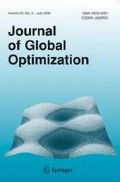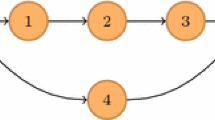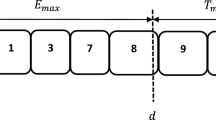Abstract
This paper considers the problem of schedulingn jobs on a single machine to minimize the total cost incurred by their respective flow time and earliness penalties. It is assumed that each job has a due date that must be met, and that preemptions are not allowed. The problem is formulated as a dynamic program (DP) and solved with a reaching algorithm that exploits a series of dominance properties and efficiently generated bounds. A major factor underlying the effectiveness of the approach is the use of a greedy randomized adaptive search procedure (GRASP) to construct high quality feasible solutions. These solutions serve as upper bounds on the optimum, and permit a predominant portion of the state space to be fathomed during the DP recursion.
To evaluate the performance of the algorithm, an experimental design involving over 240 randomly generated problems was followed. The test results indicate that problems with up to 30 jobs can be readily solved on a microcomputer in less than 12 minutes. This represents a significant improvement over previously reported results for both dynamic programming and mixed integer linear programming approaches.
Similar content being viewed by others
References
Baker, K. R. and Bertrand, J. W. M. (1981), A Comparison of Due Date Selection Rules,AIIE Transactions 13, 123–131.
Bansal, S. P. 1980), Single Machine Scheduling to Minimize Weighted Sum of Completion Times with Secondary Criterion — a Branch and Bound Approach,European Journal of Operational Research 5, 177–181.
Bard, J. F. and Feo, T. A. (1989), Operations Sequencing in Discrete Parts Manufacturing,Management Science 35(2), 249–255.
Barnes, J. W. and Vanston, L. K. (1981), Scheduling Jobs with Linear Delay Penalties and Sequences Dependent Setup Costs,Operations Research 29(1), 146–160.
Bomberger, E. E. (1966), A Dynamic Programming Approach to a Lot Size Scheduling Problem,Management Science 20, 101–109.
Bratley, P., Florian, M., and Robillard, P. (1971), Scheduling with Earliest Start and Due Date Constraints,Naval Research Logistics Quarterly 18, 511–517.
Chand, S. and Schneeberger, H. (1988), Single Machine Scheduling to Minimize Weighted Earliness Subject to No Tardy Jobs,European Journal of Operational Research 34, 221–230.
Denardo, E. V. and Fox, B. L. (1979), Shortest Route Methods; 1. Reaching, Pruning and Buckets,Operations Research 27, 161–186.
Dobson, G., Karmarkar, U. S., and Rummel, J. F. (1987), Batching to Minimize Flow Times on One Machine,Management Science 33, 784–799.
Dreyfus, S. E. and Law, A. (1976),The Art and Theory of Dynamic Programming, Academic Press, New York.
Erschler, J., Fontan, G., Merce, C., and Roubellat, F. (1982), Applying New Dominance Concepts to Job Schedule Optimization,European Journal of Operational Research 11, 60–66.
Faaland, B. and Schmitt, T. (1987), Scheduling Tasks with Due Dates in a Fabrication/Assembly Process,Operations Research 35, 378–388.
Feo, T. A., Venkatraman, K. and Bard, J. F. (1991), A GRASP for a Difficult Single Machine Scheduling Problem,Computers & Operations Research 18(8), 635–643.
Fry, T. D. and Leong, G. K. (1987) A Bi-Criterion Approach to Minimizing Inventory Costs on a Single Machine When Early Shipments Are Forbidden,Computers & Operations Research 14, 363–368.
Garey, M. R. and Johnson, D. S. (1979),Computers and Intractability: A Guide to the Theory of NP-Completeness, W. H. Freeman & Co., San Francisco.
Gupta, S. K. and Kyparisis, J. (1987), Single Machine Scheduling Research,Omega 15, 207–227.
Harriri, A. M. A. and Potts, C. N. (1983), An Algorithm for Single Machine Sequencing with Release Dates to Minimize Total Weighted Completion Time,Discrete Applied Math 5, 99–109.
Held, M. and Karp, R. M. (1962), A Dynamic Programming Approach to Sequencing Problems,J. SIAM 10, 196–210.
Kanet, J. J. (1981), Minimizing the Average Deviation of Job Completion Times about a Common Due Date,Naval Research Logistical Quarterly 28, 643–651.
Kirkpatrick, S., Gelatt, Jr., C. D., and Vecchi, M. P. (May 13, 1983), Optimization by Simulated Annealing,Science 220(4598), 671–680.
Morin, T. L. and Marsten, R. E. (1976), Branch-and-Bound Strategies for Dynamic Programming,Operations Research 24(4), 611–627.
Posner, M. E. (1985), Minimizing Weighted Completion Times with Deadlines,Operations Research 33, 562–574.
Potts, C. C. and Van Wassenhove, L. N. (1985), A Branch and Bound Algorithm for the Total Weighted Tardiness Problem,Operations Research 33, 363–377.
Sen, T., Raizadeh, F. M. E., and Dileepan, P. (1988), A Branch and Bound Approach the Bicriterion Problem Involving Total Flow Time and Range of Lateness,Management Science 34, 254–260.
Author information
Authors and Affiliations
Rights and permissions
About this article
Cite this article
Bard, J.F., Venkatraman, K. & Feo, T.A. Single machine scheduling with flow time and earliness penalties. J Glob Optim 3, 289–309 (1993). https://doi.org/10.1007/BF01096772
Received:
Accepted:
Issue Date:
DOI: https://doi.org/10.1007/BF01096772




